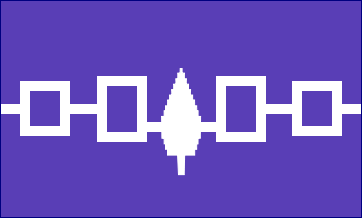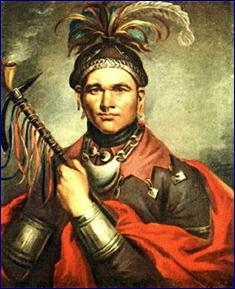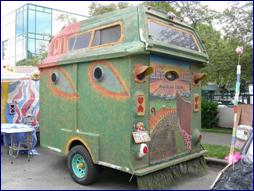XI. Governing
either log in or click here to purchase.
Log in here to access video.
Haven't purchased Eye of the Storm Leadership?
Starting Point / The Iroquois Confederates
The American version of democracy rests on a set of fundamental concepts developed when the colonies separated from England in the 1700s. The new and breathtakingly bold social contracts governing equality, freedom, and the mechanics of self-government were fiercely debated and then spelled out in foundational documents: the Declaration of Independence, the Constitution, and the Federalist Papers. They weren’t, however, the first such democratic arrangement in North America. In fact, there is a recurring suspicion that the thinking of Thomas Jefferson, Ben Franklin, John Adams, and other early American leaders was influenced by a three century old democratic alliance known as the Iroquois Confederation.
 Flag of the Iroquois Confederacy. Credit: Wikimedia Commons.
Flag of the Iroquois Confederacy. Credit: Wikimedia Commons.Both legend and history says that the Confederation was founded by the real Hiawatha and his friend and ally Dekanawidah. Unlike the peculiar pictures painted by Henry Wadsworth Longfellow and Walt Disney, the real Hiawatha was a great statesman and peacemaker. Together, he and Dekanawidah helped organize the League in the face of two threats. One was the external predations of the Mohicans and other Algonquian tribes. The other was the internal dangers posed by a despotic and often murderous Onondaga chief named Atorarho. Hiawatha’s and Dekanawidah’s early organizing efforts were slow to take root but succeeded when Atorarho was both pressured and flattered into helping lead the new alliance.
Hiawatha’s and Dekanawidah’s persuasions were clever. Representation to the council was uneven, with some tribes like the Onondagas having more delegates than others. The great equalizing rule, however, was unanimity. Each tribe retained its own sovereignty and could present any matter it wished for discussion. If at least one other tribe wished to hear the matter, the Council was obliged to hear it. Matters were then deliberated in a prescribed sequence with each member of the council having the right of veto. As a practical matter, Atorarho had no more real power than anyone else. Disputed matters were discussed, compromised, postponed, or dropped. The will of the group was then expressed by the leading chief. If consensus was not reached, each tribe was free to act as it saw fit so long as it did no harm to another member of the Confederation.
Many rituals attended the Council’s deliberations, with different tribes serving as the carriers of different customs central to the whole. Though power was decentralized, some tribes were considered “Older Brothers,� which conferred early  speaking rights and a kind of “first among equals� tradition. The Onondagas became the “Faith Keepers� and holders of the council fire. Meetings were conducted in a Long House. Before the practical matters at hand were taken up, a condolence ceremony would be held to grieve for members of the Council who had died since the previous meeting.
 Cornplanter, A Seneca Chief. Credit: Wikimedia Commons.
Cornplanter, A Seneca Chief. Credit: Wikimedia Commons.This was followed by a roll call, in which the names of the great founding chiefs of the first Council were remembered. Most native peoples around the world preserve their longest memories in just such a way. They chant their genealogies to understand how all are intricately related and to call to mind the great stories of their origins. In those roll calls, and to this day, Hiawatha and Dekanawidah are remembered by the Mohawk, Oneida, Onondaga, Seneca, Cayuga, and Tuscarora nations as great and wise leaders. The Confederacy they helped create is revered as “The Great Peace.�[i]

101Â Â Contestations
“I don't like people who are in politics for themselves and not for others. You want that, you can go into show business.'� Elvis Presley
 Local Art Fair. Credit: Wikimedia Commons.
Local Art Fair. Credit: Wikimedia Commons.
102Â Â Ossification
“A team effort is a lot of people doing what I say.� Michael Winner
|
|
This site managed with Dynamic Website Technology
from Mediate.com Products and Services |
